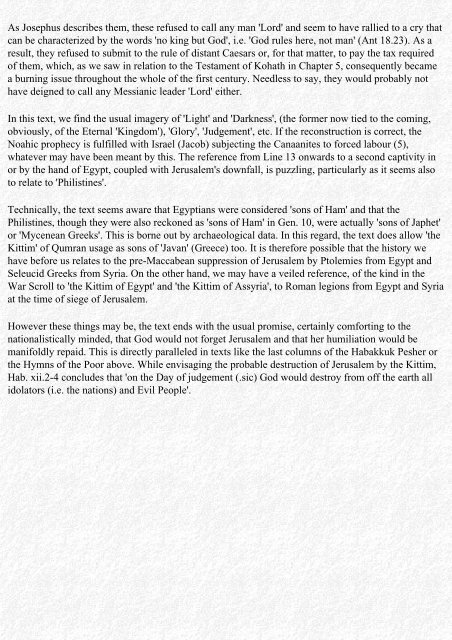Dead Sea Scrolls Uncovered - The Preterist Archive
Dead Sea Scrolls Uncovered - The Preterist Archive
Dead Sea Scrolls Uncovered - The Preterist Archive
Create successful ePaper yourself
Turn your PDF publications into a flip-book with our unique Google optimized e-Paper software.
As Josephus describes them, these refused to call any man 'Lord' and seem to have rallied to a cry that<br />
can be characterized by the words 'no king but God', i.e. 'God rules here, not man' (Ant 18.23). As a<br />
result, they refused to submit to the rule of distant Caesars or, for that matter, to pay the tax required<br />
of them, which, as we saw in relation to the Testament of Kohath in Chapter 5, consequently became<br />
a burning issue throughout the whole of the first century. Needless to say, they would probably not<br />
have deigned to call any Messianic leader 'Lord' either.<br />
In this text, we find the usual imagery of 'Light' and 'Darkness', (the former now tied to the coming,<br />
obviously, of the Eternal 'Kingdom'), 'Glory', 'Judgement', etc. If the reconstruction is correct, the<br />
Noahic prophecy is fulfilled with Israel (Jacob) subjecting the Canaanites to forced labour (5),<br />
whatever may have been meant by this. <strong>The</strong> reference from Line 13 onwards to a second captivity in<br />
or by the hand of Egypt, coupled with Jerusalem's downfall, is puzzling, particularly as it seems also<br />
to relate to 'Philistines'.<br />
Technically, the text seems aware that Egyptians were considered 'sons of Ham' and that the<br />
Philistines, though they were also reckoned as 'sons of Ham' in Gen. 10, were actually 'sons of Japhet'<br />
or 'Mycenean Greeks'. This is borne out by archaeological data. In this regard, the text does allow 'the<br />
Kittim' of Qumran usage as sons of 'Javan' (Greece) too. It is therefore possible that the history we<br />
have before us relates to the pre-Maccabean suppression of Jerusalem by Ptolemies from Egypt and<br />
Seleucid Greeks from Syria. On the other hand, we may have a veiled reference, of the kind in the<br />
War Scroll to 'the Kittim of Egypt' and 'the Kittim of Assyria', to Roman legions from Egypt and Syria<br />
at the time of siege of Jerusalem.<br />
However these things may be, the text ends with the usual promise, certainly comforting to the<br />
nationalistically minded, that God would not forget Jerusalem and that her humiliation would be<br />
manifoldly repaid. This is directly paralleled in texts like the last columns of the Habakkuk Pesher or<br />
the Hymns of the Poor above. While envisaging the probable destruction of Jerusalem by the Kittim,<br />
Hab. xii.2-4 concludes that 'on the Day of judgement (.sic) God would destroy from off the earth all<br />
idolators (i.e. the nations) and Evil People'.

















